Strategy Development in Cross-Border and Global Organizations Report
VerifiedAdded on 2022/11/28
|14
|4060
|371
Report
AI Summary
This report provides a comprehensive analysis of ExxonMobil's strategy development in cross-border and global organizations. It examines the company's approach to horizontal business practices, merger and acquisition strategies, and the importance of political, social, ethical, and operational needs in international business. The report highlights ExxonMobil's focus on sustainability, environmental protection, and long-term business prosperity. It also explores the role of collective strategies, ethical business practices, and the influence of government policies and regulations. Furthermore, the report discusses key challenges faced by ExxonMobil, including oil price fluctuations, worker health and safety issues, and environmental concerns. Finally, it analyzes the factors that influence collective strategy, such as political, global, social, and cultural factors, and emphasizes the importance of a benevolent collective strategy for establishing a strong business network in the global market.
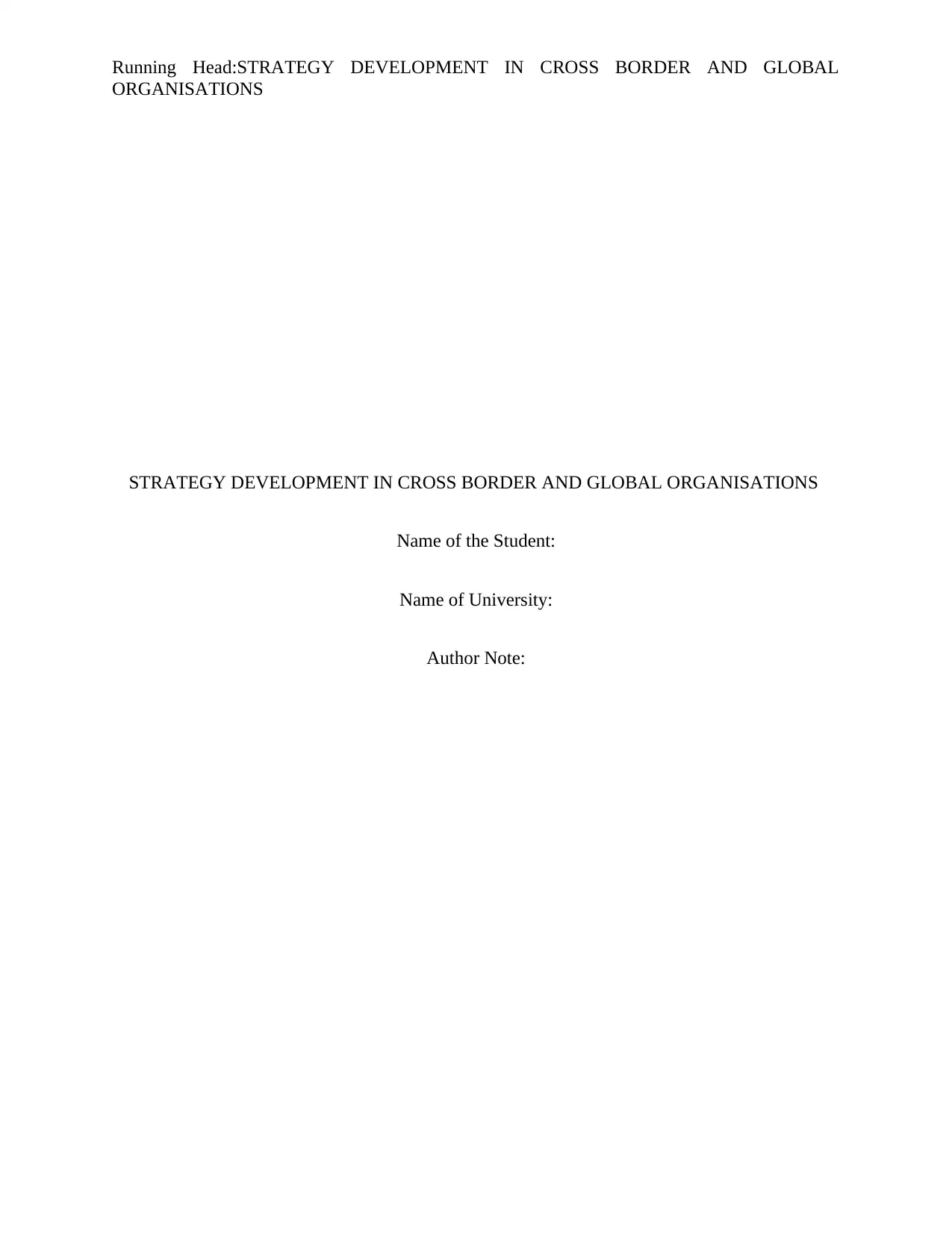
Running Head:STRATEGY DEVELOPMENT IN CROSS BORDER AND GLOBAL
ORGANISATIONS
STRATEGY DEVELOPMENT IN CROSS BORDER AND GLOBAL ORGANISATIONS
Name of the Student:
Name of University:
Author Note:
ORGANISATIONS
STRATEGY DEVELOPMENT IN CROSS BORDER AND GLOBAL ORGANISATIONS
Name of the Student:
Name of University:
Author Note:
Paraphrase This Document
Need a fresh take? Get an instant paraphrase of this document with our AI Paraphraser
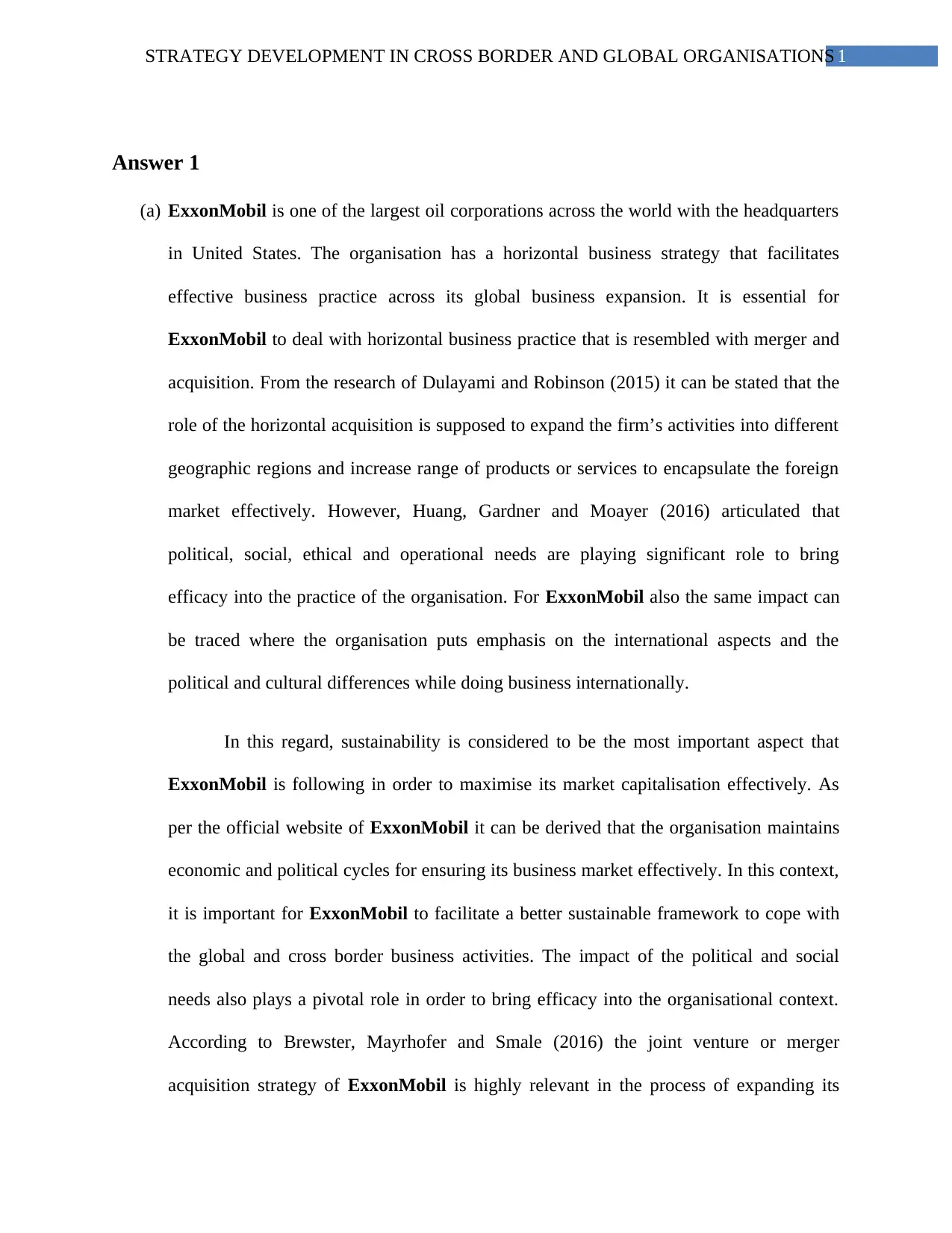
1STRATEGY DEVELOPMENT IN CROSS BORDER AND GLOBAL ORGANISATIONS
Answer 1
(a) ExxonMobil is one of the largest oil corporations across the world with the headquarters
in United States. The organisation has a horizontal business strategy that facilitates
effective business practice across its global business expansion. It is essential for
ExxonMobil to deal with horizontal business practice that is resembled with merger and
acquisition. From the research of Dulayami and Robinson (2015) it can be stated that the
role of the horizontal acquisition is supposed to expand the firm’s activities into different
geographic regions and increase range of products or services to encapsulate the foreign
market effectively. However, Huang, Gardner and Moayer (2016) articulated that
political, social, ethical and operational needs are playing significant role to bring
efficacy into the practice of the organisation. For ExxonMobil also the same impact can
be traced where the organisation puts emphasis on the international aspects and the
political and cultural differences while doing business internationally.
In this regard, sustainability is considered to be the most important aspect that
ExxonMobil is following in order to maximise its market capitalisation effectively. As
per the official website of ExxonMobil it can be derived that the organisation maintains
economic and political cycles for ensuring its business market effectively. In this context,
it is important for ExxonMobil to facilitate a better sustainable framework to cope with
the global and cross border business activities. The impact of the political and social
needs also plays a pivotal role in order to bring efficacy into the organisational context.
According to Brewster, Mayrhofer and Smale (2016) the joint venture or merger
acquisition strategy of ExxonMobil is highly relevant in the process of expanding its
Answer 1
(a) ExxonMobil is one of the largest oil corporations across the world with the headquarters
in United States. The organisation has a horizontal business strategy that facilitates
effective business practice across its global business expansion. It is essential for
ExxonMobil to deal with horizontal business practice that is resembled with merger and
acquisition. From the research of Dulayami and Robinson (2015) it can be stated that the
role of the horizontal acquisition is supposed to expand the firm’s activities into different
geographic regions and increase range of products or services to encapsulate the foreign
market effectively. However, Huang, Gardner and Moayer (2016) articulated that
political, social, ethical and operational needs are playing significant role to bring
efficacy into the practice of the organisation. For ExxonMobil also the same impact can
be traced where the organisation puts emphasis on the international aspects and the
political and cultural differences while doing business internationally.
In this regard, sustainability is considered to be the most important aspect that
ExxonMobil is following in order to maximise its market capitalisation effectively. As
per the official website of ExxonMobil it can be derived that the organisation maintains
economic and political cycles for ensuring its business market effectively. In this context,
it is important for ExxonMobil to facilitate a better sustainable framework to cope with
the global and cross border business activities. The impact of the political and social
needs also plays a pivotal role in order to bring efficacy into the organisational context.
According to Brewster, Mayrhofer and Smale (2016) the joint venture or merger
acquisition strategy of ExxonMobil is highly relevant in the process of expanding its
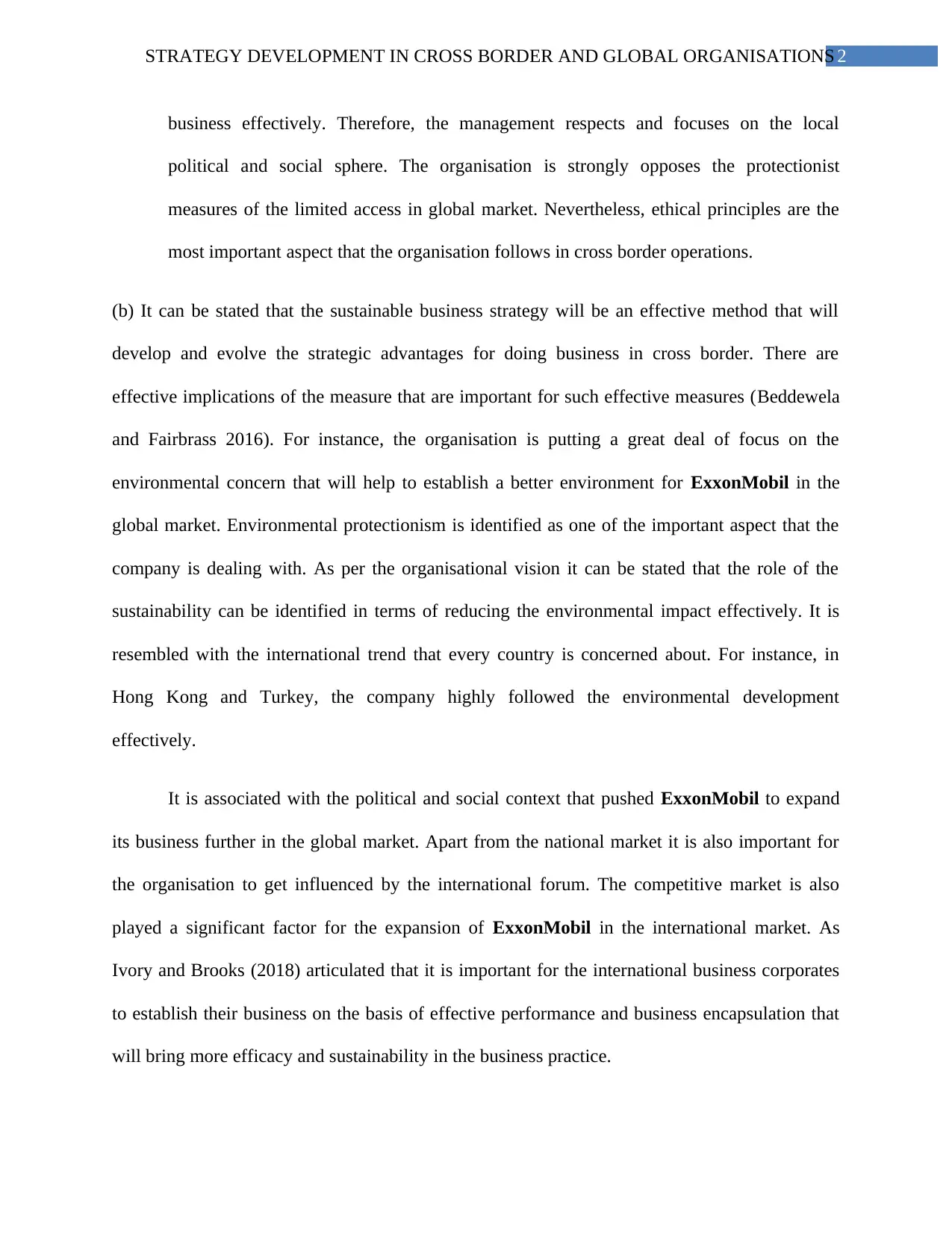
2STRATEGY DEVELOPMENT IN CROSS BORDER AND GLOBAL ORGANISATIONS
business effectively. Therefore, the management respects and focuses on the local
political and social sphere. The organisation is strongly opposes the protectionist
measures of the limited access in global market. Nevertheless, ethical principles are the
most important aspect that the organisation follows in cross border operations.
(b) It can be stated that the sustainable business strategy will be an effective method that will
develop and evolve the strategic advantages for doing business in cross border. There are
effective implications of the measure that are important for such effective measures (Beddewela
and Fairbrass 2016). For instance, the organisation is putting a great deal of focus on the
environmental concern that will help to establish a better environment for ExxonMobil in the
global market. Environmental protectionism is identified as one of the important aspect that the
company is dealing with. As per the organisational vision it can be stated that the role of the
sustainability can be identified in terms of reducing the environmental impact effectively. It is
resembled with the international trend that every country is concerned about. For instance, in
Hong Kong and Turkey, the company highly followed the environmental development
effectively.
It is associated with the political and social context that pushed ExxonMobil to expand
its business further in the global market. Apart from the national market it is also important for
the organisation to get influenced by the international forum. The competitive market is also
played a significant factor for the expansion of ExxonMobil in the international market. As
Ivory and Brooks (2018) articulated that it is important for the international business corporates
to establish their business on the basis of effective performance and business encapsulation that
will bring more efficacy and sustainability in the business practice.
business effectively. Therefore, the management respects and focuses on the local
political and social sphere. The organisation is strongly opposes the protectionist
measures of the limited access in global market. Nevertheless, ethical principles are the
most important aspect that the organisation follows in cross border operations.
(b) It can be stated that the sustainable business strategy will be an effective method that will
develop and evolve the strategic advantages for doing business in cross border. There are
effective implications of the measure that are important for such effective measures (Beddewela
and Fairbrass 2016). For instance, the organisation is putting a great deal of focus on the
environmental concern that will help to establish a better environment for ExxonMobil in the
global market. Environmental protectionism is identified as one of the important aspect that the
company is dealing with. As per the organisational vision it can be stated that the role of the
sustainability can be identified in terms of reducing the environmental impact effectively. It is
resembled with the international trend that every country is concerned about. For instance, in
Hong Kong and Turkey, the company highly followed the environmental development
effectively.
It is associated with the political and social context that pushed ExxonMobil to expand
its business further in the global market. Apart from the national market it is also important for
the organisation to get influenced by the international forum. The competitive market is also
played a significant factor for the expansion of ExxonMobil in the international market. As
Ivory and Brooks (2018) articulated that it is important for the international business corporates
to establish their business on the basis of effective performance and business encapsulation that
will bring more efficacy and sustainability in the business practice.
⊘ This is a preview!⊘
Do you want full access?
Subscribe today to unlock all pages.

Trusted by 1+ million students worldwide
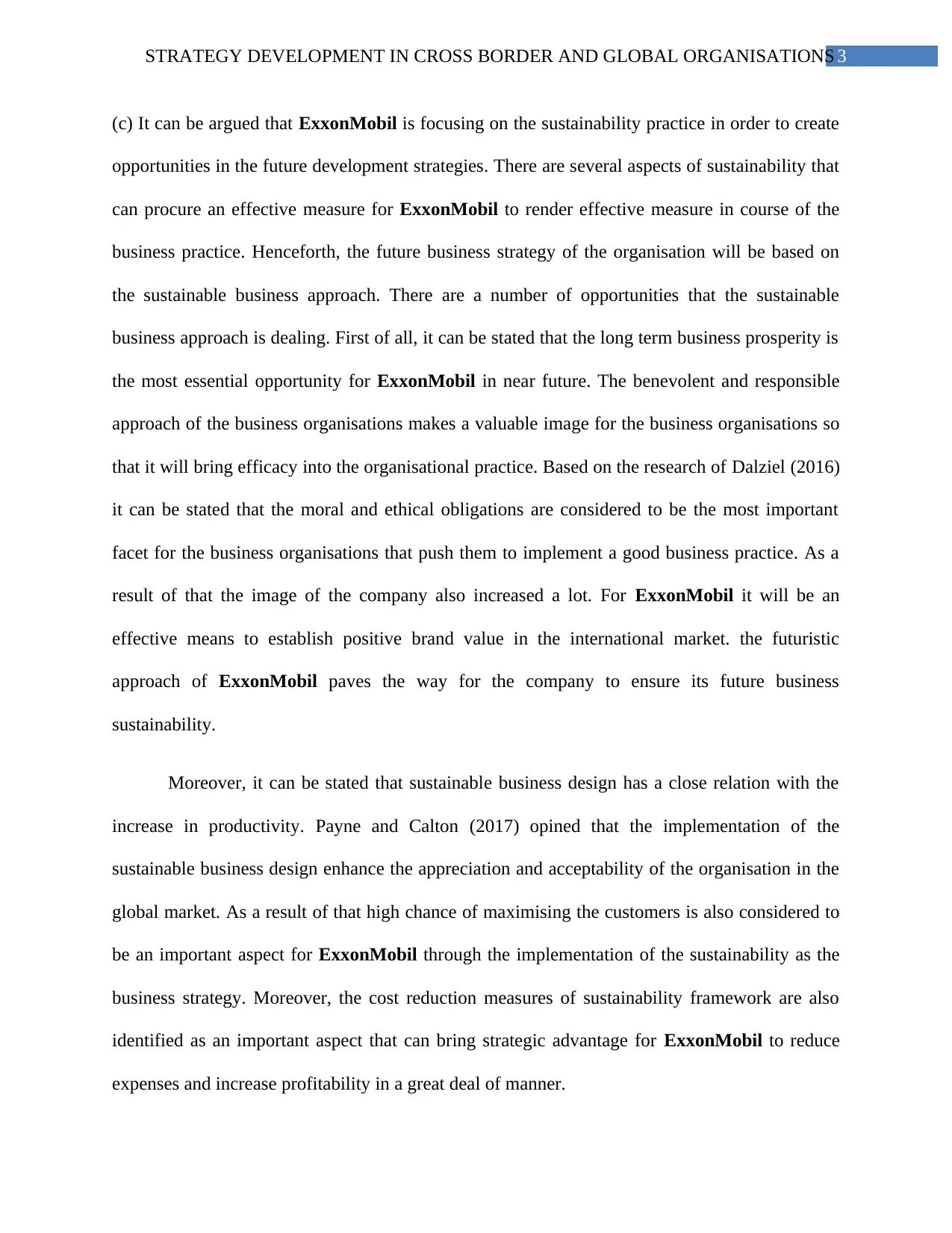
3STRATEGY DEVELOPMENT IN CROSS BORDER AND GLOBAL ORGANISATIONS
(c) It can be argued that ExxonMobil is focusing on the sustainability practice in order to create
opportunities in the future development strategies. There are several aspects of sustainability that
can procure an effective measure for ExxonMobil to render effective measure in course of the
business practice. Henceforth, the future business strategy of the organisation will be based on
the sustainable business approach. There are a number of opportunities that the sustainable
business approach is dealing. First of all, it can be stated that the long term business prosperity is
the most essential opportunity for ExxonMobil in near future. The benevolent and responsible
approach of the business organisations makes a valuable image for the business organisations so
that it will bring efficacy into the organisational practice. Based on the research of Dalziel (2016)
it can be stated that the moral and ethical obligations are considered to be the most important
facet for the business organisations that push them to implement a good business practice. As a
result of that the image of the company also increased a lot. For ExxonMobil it will be an
effective means to establish positive brand value in the international market. the futuristic
approach of ExxonMobil paves the way for the company to ensure its future business
sustainability.
Moreover, it can be stated that sustainable business design has a close relation with the
increase in productivity. Payne and Calton (2017) opined that the implementation of the
sustainable business design enhance the appreciation and acceptability of the organisation in the
global market. As a result of that high chance of maximising the customers is also considered to
be an important aspect for ExxonMobil through the implementation of the sustainability as the
business strategy. Moreover, the cost reduction measures of sustainability framework are also
identified as an important aspect that can bring strategic advantage for ExxonMobil to reduce
expenses and increase profitability in a great deal of manner.
(c) It can be argued that ExxonMobil is focusing on the sustainability practice in order to create
opportunities in the future development strategies. There are several aspects of sustainability that
can procure an effective measure for ExxonMobil to render effective measure in course of the
business practice. Henceforth, the future business strategy of the organisation will be based on
the sustainable business approach. There are a number of opportunities that the sustainable
business approach is dealing. First of all, it can be stated that the long term business prosperity is
the most essential opportunity for ExxonMobil in near future. The benevolent and responsible
approach of the business organisations makes a valuable image for the business organisations so
that it will bring efficacy into the organisational practice. Based on the research of Dalziel (2016)
it can be stated that the moral and ethical obligations are considered to be the most important
facet for the business organisations that push them to implement a good business practice. As a
result of that the image of the company also increased a lot. For ExxonMobil it will be an
effective means to establish positive brand value in the international market. the futuristic
approach of ExxonMobil paves the way for the company to ensure its future business
sustainability.
Moreover, it can be stated that sustainable business design has a close relation with the
increase in productivity. Payne and Calton (2017) opined that the implementation of the
sustainable business design enhance the appreciation and acceptability of the organisation in the
global market. As a result of that high chance of maximising the customers is also considered to
be an important aspect for ExxonMobil through the implementation of the sustainability as the
business strategy. Moreover, the cost reduction measures of sustainability framework are also
identified as an important aspect that can bring strategic advantage for ExxonMobil to reduce
expenses and increase profitability in a great deal of manner.
Paraphrase This Document
Need a fresh take? Get an instant paraphrase of this document with our AI Paraphraser
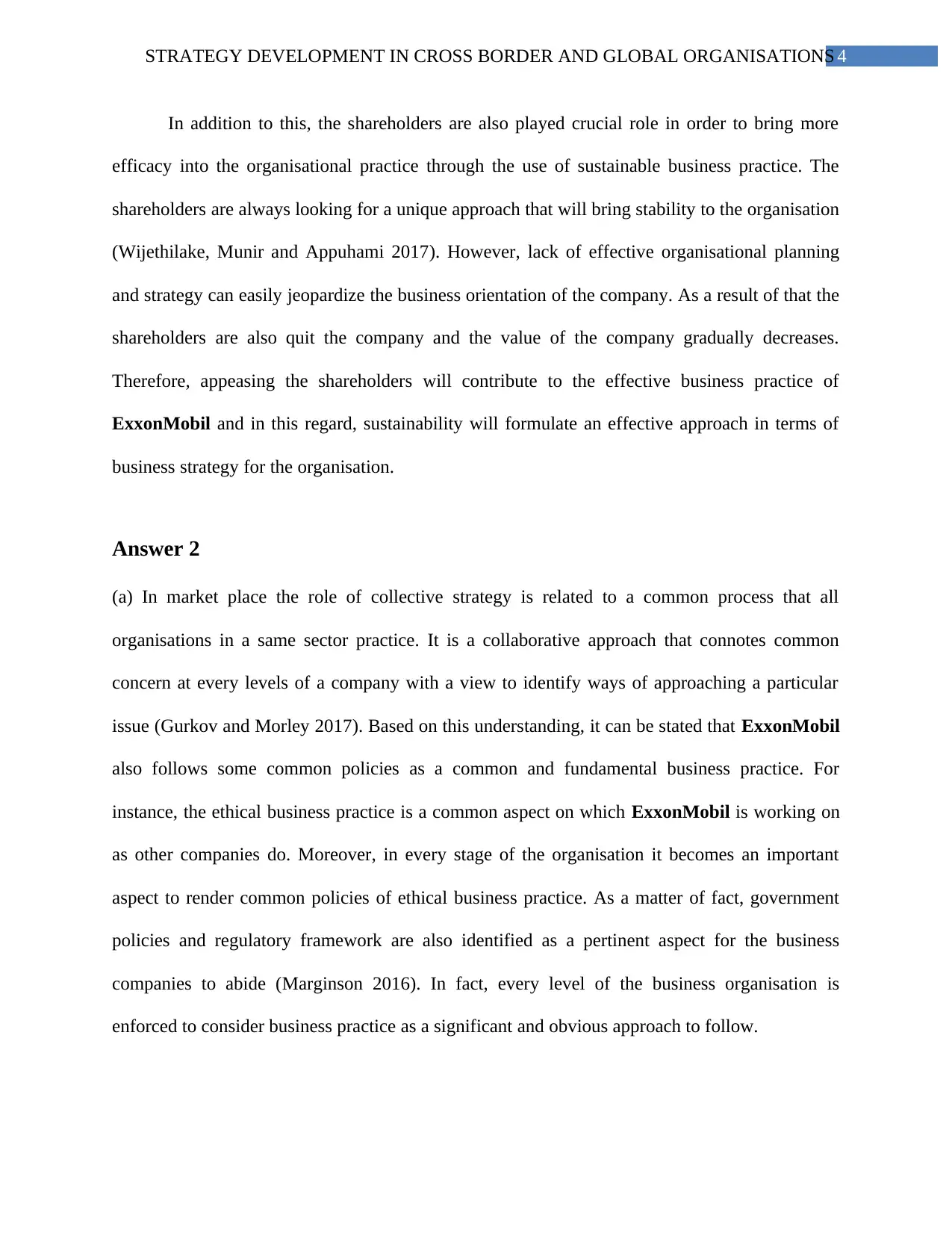
4STRATEGY DEVELOPMENT IN CROSS BORDER AND GLOBAL ORGANISATIONS
In addition to this, the shareholders are also played crucial role in order to bring more
efficacy into the organisational practice through the use of sustainable business practice. The
shareholders are always looking for a unique approach that will bring stability to the organisation
(Wijethilake, Munir and Appuhami 2017). However, lack of effective organisational planning
and strategy can easily jeopardize the business orientation of the company. As a result of that the
shareholders are also quit the company and the value of the company gradually decreases.
Therefore, appeasing the shareholders will contribute to the effective business practice of
ExxonMobil and in this regard, sustainability will formulate an effective approach in terms of
business strategy for the organisation.
Answer 2
(a) In market place the role of collective strategy is related to a common process that all
organisations in a same sector practice. It is a collaborative approach that connotes common
concern at every levels of a company with a view to identify ways of approaching a particular
issue (Gurkov and Morley 2017). Based on this understanding, it can be stated that ExxonMobil
also follows some common policies as a common and fundamental business practice. For
instance, the ethical business practice is a common aspect on which ExxonMobil is working on
as other companies do. Moreover, in every stage of the organisation it becomes an important
aspect to render common policies of ethical business practice. As a matter of fact, government
policies and regulatory framework are also identified as a pertinent aspect for the business
companies to abide (Marginson 2016). In fact, every level of the business organisation is
enforced to consider business practice as a significant and obvious approach to follow.
In addition to this, the shareholders are also played crucial role in order to bring more
efficacy into the organisational practice through the use of sustainable business practice. The
shareholders are always looking for a unique approach that will bring stability to the organisation
(Wijethilake, Munir and Appuhami 2017). However, lack of effective organisational planning
and strategy can easily jeopardize the business orientation of the company. As a result of that the
shareholders are also quit the company and the value of the company gradually decreases.
Therefore, appeasing the shareholders will contribute to the effective business practice of
ExxonMobil and in this regard, sustainability will formulate an effective approach in terms of
business strategy for the organisation.
Answer 2
(a) In market place the role of collective strategy is related to a common process that all
organisations in a same sector practice. It is a collaborative approach that connotes common
concern at every levels of a company with a view to identify ways of approaching a particular
issue (Gurkov and Morley 2017). Based on this understanding, it can be stated that ExxonMobil
also follows some common policies as a common and fundamental business practice. For
instance, the ethical business practice is a common aspect on which ExxonMobil is working on
as other companies do. Moreover, in every stage of the organisation it becomes an important
aspect to render common policies of ethical business practice. As a matter of fact, government
policies and regulatory framework are also identified as a pertinent aspect for the business
companies to abide (Marginson 2016). In fact, every level of the business organisation is
enforced to consider business practice as a significant and obvious approach to follow.
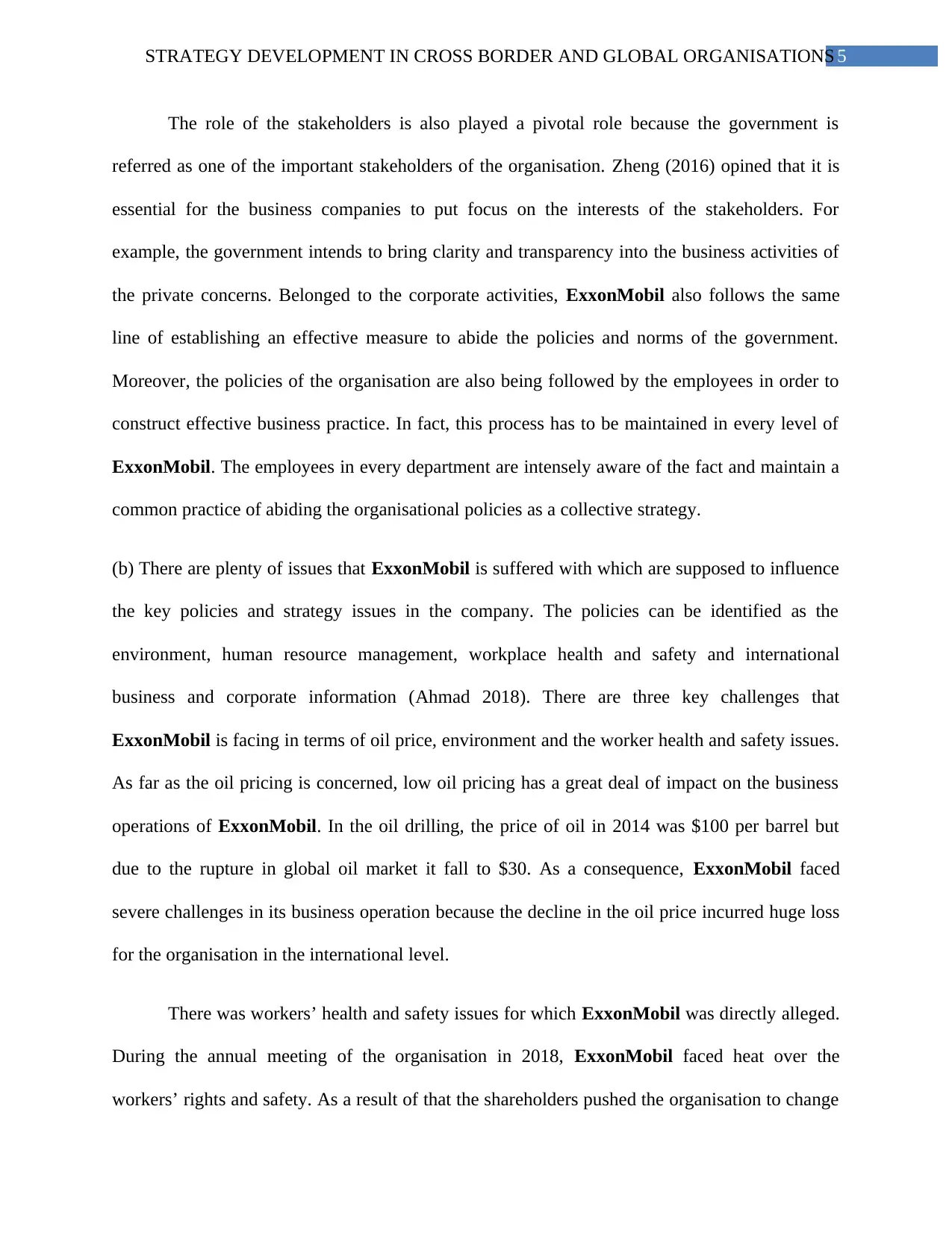
5STRATEGY DEVELOPMENT IN CROSS BORDER AND GLOBAL ORGANISATIONS
The role of the stakeholders is also played a pivotal role because the government is
referred as one of the important stakeholders of the organisation. Zheng (2016) opined that it is
essential for the business companies to put focus on the interests of the stakeholders. For
example, the government intends to bring clarity and transparency into the business activities of
the private concerns. Belonged to the corporate activities, ExxonMobil also follows the same
line of establishing an effective measure to abide the policies and norms of the government.
Moreover, the policies of the organisation are also being followed by the employees in order to
construct effective business practice. In fact, this process has to be maintained in every level of
ExxonMobil. The employees in every department are intensely aware of the fact and maintain a
common practice of abiding the organisational policies as a collective strategy.
(b) There are plenty of issues that ExxonMobil is suffered with which are supposed to influence
the key policies and strategy issues in the company. The policies can be identified as the
environment, human resource management, workplace health and safety and international
business and corporate information (Ahmad 2018). There are three key challenges that
ExxonMobil is facing in terms of oil price, environment and the worker health and safety issues.
As far as the oil pricing is concerned, low oil pricing has a great deal of impact on the business
operations of ExxonMobil. In the oil drilling, the price of oil in 2014 was $100 per barrel but
due to the rupture in global oil market it fall to $30. As a consequence, ExxonMobil faced
severe challenges in its business operation because the decline in the oil price incurred huge loss
for the organisation in the international level.
There was workers’ health and safety issues for which ExxonMobil was directly alleged.
During the annual meeting of the organisation in 2018, ExxonMobil faced heat over the
workers’ rights and safety. As a result of that the shareholders pushed the organisation to change
The role of the stakeholders is also played a pivotal role because the government is
referred as one of the important stakeholders of the organisation. Zheng (2016) opined that it is
essential for the business companies to put focus on the interests of the stakeholders. For
example, the government intends to bring clarity and transparency into the business activities of
the private concerns. Belonged to the corporate activities, ExxonMobil also follows the same
line of establishing an effective measure to abide the policies and norms of the government.
Moreover, the policies of the organisation are also being followed by the employees in order to
construct effective business practice. In fact, this process has to be maintained in every level of
ExxonMobil. The employees in every department are intensely aware of the fact and maintain a
common practice of abiding the organisational policies as a collective strategy.
(b) There are plenty of issues that ExxonMobil is suffered with which are supposed to influence
the key policies and strategy issues in the company. The policies can be identified as the
environment, human resource management, workplace health and safety and international
business and corporate information (Ahmad 2018). There are three key challenges that
ExxonMobil is facing in terms of oil price, environment and the worker health and safety issues.
As far as the oil pricing is concerned, low oil pricing has a great deal of impact on the business
operations of ExxonMobil. In the oil drilling, the price of oil in 2014 was $100 per barrel but
due to the rupture in global oil market it fall to $30. As a consequence, ExxonMobil faced
severe challenges in its business operation because the decline in the oil price incurred huge loss
for the organisation in the international level.
There was workers’ health and safety issues for which ExxonMobil was directly alleged.
During the annual meeting of the organisation in 2018, ExxonMobil faced heat over the
workers’ rights and safety. As a result of that the shareholders pushed the organisation to change
⊘ This is a preview!⊘
Do you want full access?
Subscribe today to unlock all pages.

Trusted by 1+ million students worldwide
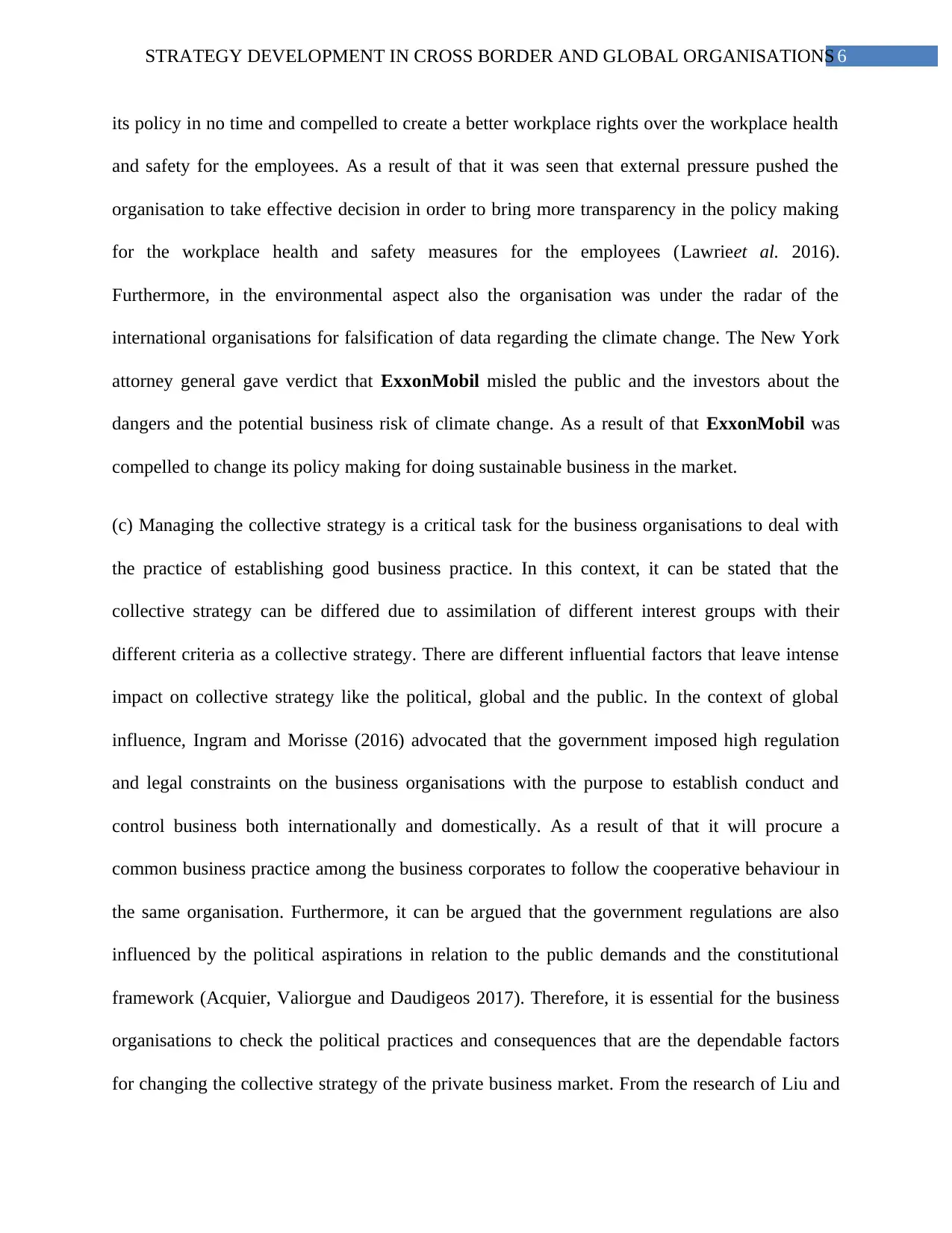
6STRATEGY DEVELOPMENT IN CROSS BORDER AND GLOBAL ORGANISATIONS
its policy in no time and compelled to create a better workplace rights over the workplace health
and safety for the employees. As a result of that it was seen that external pressure pushed the
organisation to take effective decision in order to bring more transparency in the policy making
for the workplace health and safety measures for the employees (Lawrieet al. 2016).
Furthermore, in the environmental aspect also the organisation was under the radar of the
international organisations for falsification of data regarding the climate change. The New York
attorney general gave verdict that ExxonMobil misled the public and the investors about the
dangers and the potential business risk of climate change. As a result of that ExxonMobil was
compelled to change its policy making for doing sustainable business in the market.
(c) Managing the collective strategy is a critical task for the business organisations to deal with
the practice of establishing good business practice. In this context, it can be stated that the
collective strategy can be differed due to assimilation of different interest groups with their
different criteria as a collective strategy. There are different influential factors that leave intense
impact on collective strategy like the political, global and the public. In the context of global
influence, Ingram and Morisse (2016) advocated that the government imposed high regulation
and legal constraints on the business organisations with the purpose to establish conduct and
control business both internationally and domestically. As a result of that it will procure a
common business practice among the business corporates to follow the cooperative behaviour in
the same organisation. Furthermore, it can be argued that the government regulations are also
influenced by the political aspirations in relation to the public demands and the constitutional
framework (Acquier, Valiorgue and Daudigeos 2017). Therefore, it is essential for the business
organisations to check the political practices and consequences that are the dependable factors
for changing the collective strategy of the private business market. From the research of Liu and
its policy in no time and compelled to create a better workplace rights over the workplace health
and safety for the employees. As a result of that it was seen that external pressure pushed the
organisation to take effective decision in order to bring more transparency in the policy making
for the workplace health and safety measures for the employees (Lawrieet al. 2016).
Furthermore, in the environmental aspect also the organisation was under the radar of the
international organisations for falsification of data regarding the climate change. The New York
attorney general gave verdict that ExxonMobil misled the public and the investors about the
dangers and the potential business risk of climate change. As a result of that ExxonMobil was
compelled to change its policy making for doing sustainable business in the market.
(c) Managing the collective strategy is a critical task for the business organisations to deal with
the practice of establishing good business practice. In this context, it can be stated that the
collective strategy can be differed due to assimilation of different interest groups with their
different criteria as a collective strategy. There are different influential factors that leave intense
impact on collective strategy like the political, global and the public. In the context of global
influence, Ingram and Morisse (2016) advocated that the government imposed high regulation
and legal constraints on the business organisations with the purpose to establish conduct and
control business both internationally and domestically. As a result of that it will procure a
common business practice among the business corporates to follow the cooperative behaviour in
the same organisation. Furthermore, it can be argued that the government regulations are also
influenced by the political aspirations in relation to the public demands and the constitutional
framework (Acquier, Valiorgue and Daudigeos 2017). Therefore, it is essential for the business
organisations to check the political practices and consequences that are the dependable factors
for changing the collective strategy of the private business market. From the research of Liu and
Paraphrase This Document
Need a fresh take? Get an instant paraphrase of this document with our AI Paraphraser
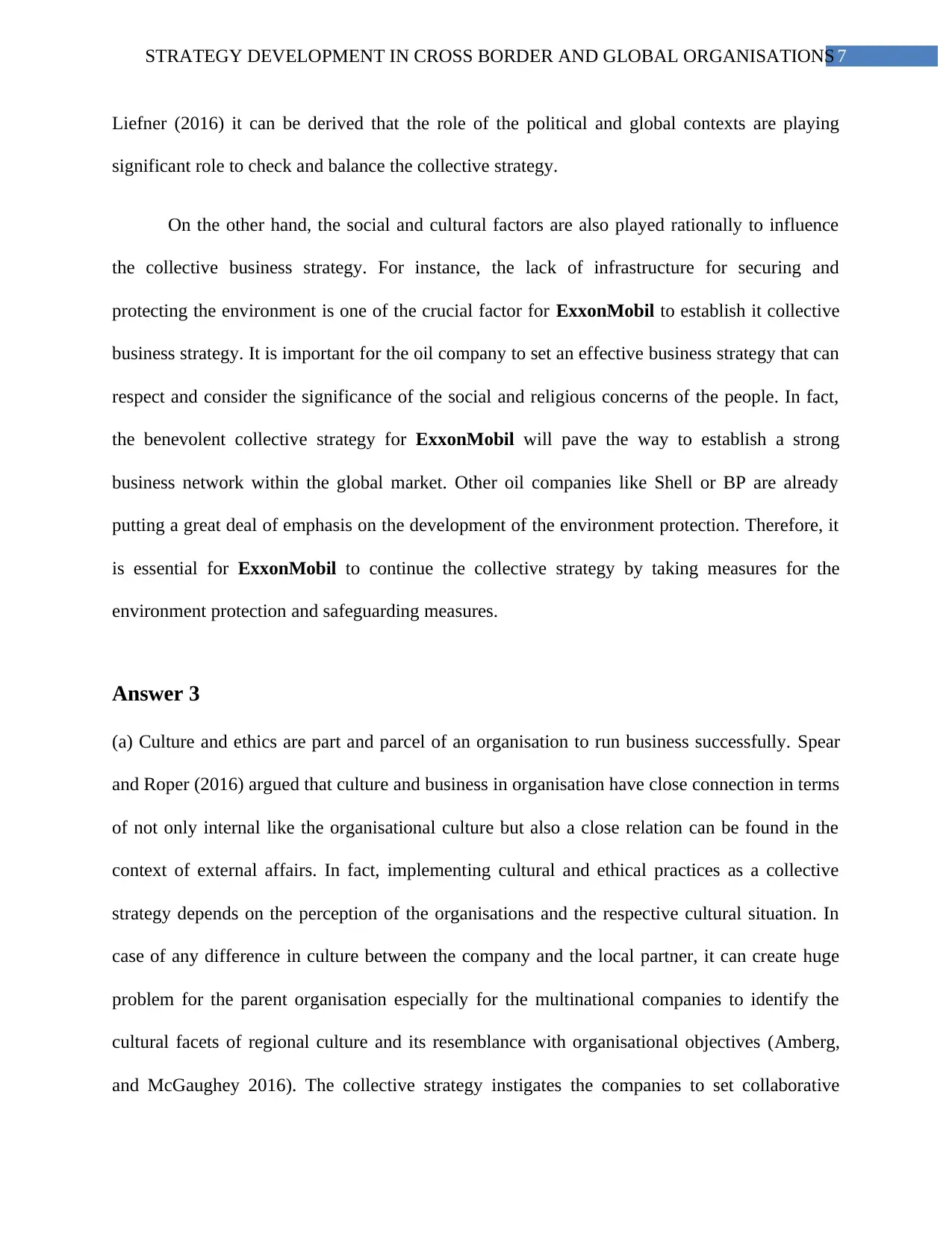
7STRATEGY DEVELOPMENT IN CROSS BORDER AND GLOBAL ORGANISATIONS
Liefner (2016) it can be derived that the role of the political and global contexts are playing
significant role to check and balance the collective strategy.
On the other hand, the social and cultural factors are also played rationally to influence
the collective business strategy. For instance, the lack of infrastructure for securing and
protecting the environment is one of the crucial factor for ExxonMobil to establish it collective
business strategy. It is important for the oil company to set an effective business strategy that can
respect and consider the significance of the social and religious concerns of the people. In fact,
the benevolent collective strategy for ExxonMobil will pave the way to establish a strong
business network within the global market. Other oil companies like Shell or BP are already
putting a great deal of emphasis on the development of the environment protection. Therefore, it
is essential for ExxonMobil to continue the collective strategy by taking measures for the
environment protection and safeguarding measures.
Answer 3
(a) Culture and ethics are part and parcel of an organisation to run business successfully. Spear
and Roper (2016) argued that culture and business in organisation have close connection in terms
of not only internal like the organisational culture but also a close relation can be found in the
context of external affairs. In fact, implementing cultural and ethical practices as a collective
strategy depends on the perception of the organisations and the respective cultural situation. In
case of any difference in culture between the company and the local partner, it can create huge
problem for the parent organisation especially for the multinational companies to identify the
cultural facets of regional culture and its resemblance with organisational objectives (Amberg,
and McGaughey 2016). The collective strategy instigates the companies to set collaborative
Liefner (2016) it can be derived that the role of the political and global contexts are playing
significant role to check and balance the collective strategy.
On the other hand, the social and cultural factors are also played rationally to influence
the collective business strategy. For instance, the lack of infrastructure for securing and
protecting the environment is one of the crucial factor for ExxonMobil to establish it collective
business strategy. It is important for the oil company to set an effective business strategy that can
respect and consider the significance of the social and religious concerns of the people. In fact,
the benevolent collective strategy for ExxonMobil will pave the way to establish a strong
business network within the global market. Other oil companies like Shell or BP are already
putting a great deal of emphasis on the development of the environment protection. Therefore, it
is essential for ExxonMobil to continue the collective strategy by taking measures for the
environment protection and safeguarding measures.
Answer 3
(a) Culture and ethics are part and parcel of an organisation to run business successfully. Spear
and Roper (2016) argued that culture and business in organisation have close connection in terms
of not only internal like the organisational culture but also a close relation can be found in the
context of external affairs. In fact, implementing cultural and ethical practices as a collective
strategy depends on the perception of the organisations and the respective cultural situation. In
case of any difference in culture between the company and the local partner, it can create huge
problem for the parent organisation especially for the multinational companies to identify the
cultural facets of regional culture and its resemblance with organisational objectives (Amberg,
and McGaughey 2016). The collective strategy instigates the companies to set collaborative
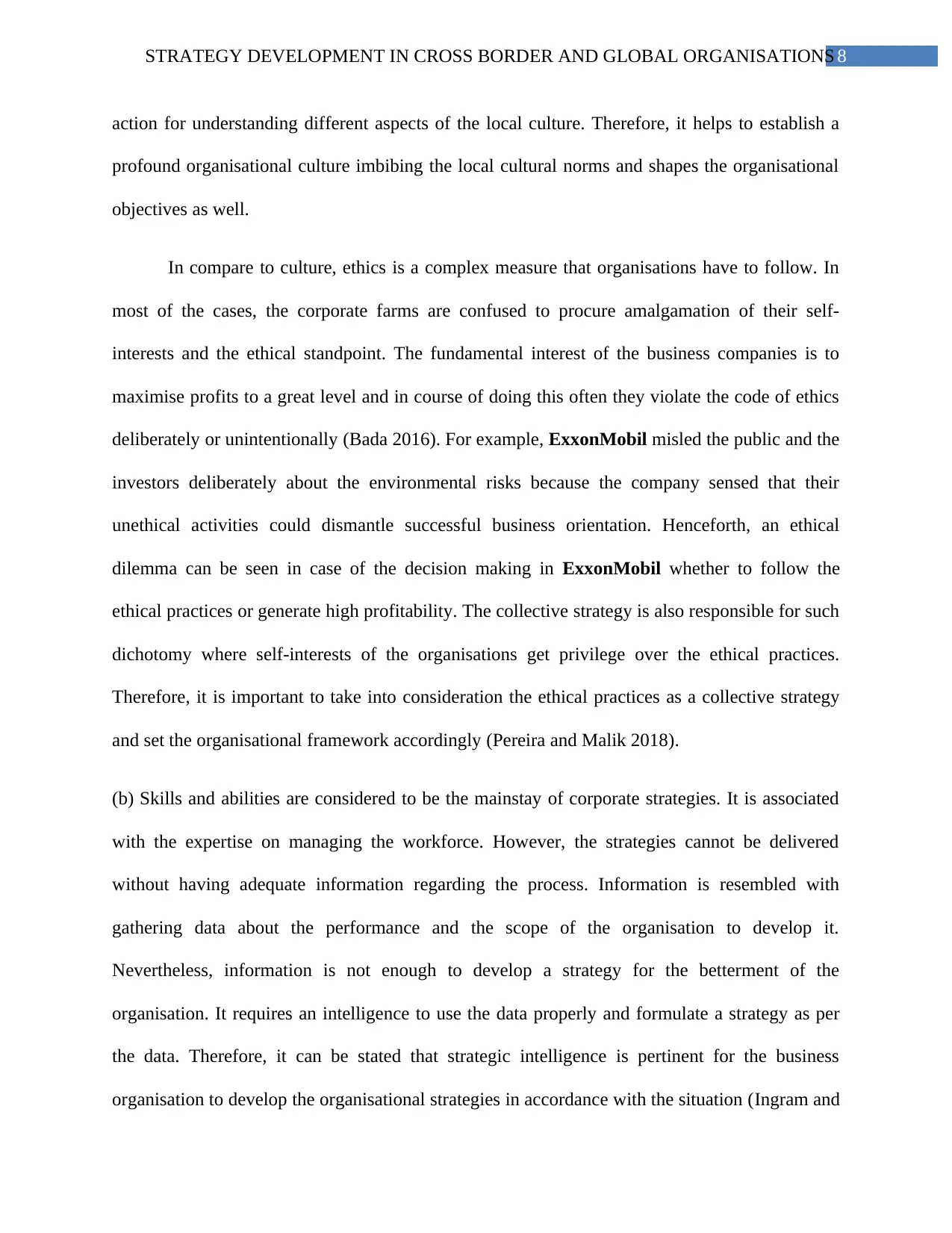
8STRATEGY DEVELOPMENT IN CROSS BORDER AND GLOBAL ORGANISATIONS
action for understanding different aspects of the local culture. Therefore, it helps to establish a
profound organisational culture imbibing the local cultural norms and shapes the organisational
objectives as well.
In compare to culture, ethics is a complex measure that organisations have to follow. In
most of the cases, the corporate farms are confused to procure amalgamation of their self-
interests and the ethical standpoint. The fundamental interest of the business companies is to
maximise profits to a great level and in course of doing this often they violate the code of ethics
deliberately or unintentionally (Bada 2016). For example, ExxonMobil misled the public and the
investors deliberately about the environmental risks because the company sensed that their
unethical activities could dismantle successful business orientation. Henceforth, an ethical
dilemma can be seen in case of the decision making in ExxonMobil whether to follow the
ethical practices or generate high profitability. The collective strategy is also responsible for such
dichotomy where self-interests of the organisations get privilege over the ethical practices.
Therefore, it is important to take into consideration the ethical practices as a collective strategy
and set the organisational framework accordingly (Pereira and Malik 2018).
(b) Skills and abilities are considered to be the mainstay of corporate strategies. It is associated
with the expertise on managing the workforce. However, the strategies cannot be delivered
without having adequate information regarding the process. Information is resembled with
gathering data about the performance and the scope of the organisation to develop it.
Nevertheless, information is not enough to develop a strategy for the betterment of the
organisation. It requires an intelligence to use the data properly and formulate a strategy as per
the data. Therefore, it can be stated that strategic intelligence is pertinent for the business
organisation to develop the organisational strategies in accordance with the situation (Ingram and
action for understanding different aspects of the local culture. Therefore, it helps to establish a
profound organisational culture imbibing the local cultural norms and shapes the organisational
objectives as well.
In compare to culture, ethics is a complex measure that organisations have to follow. In
most of the cases, the corporate farms are confused to procure amalgamation of their self-
interests and the ethical standpoint. The fundamental interest of the business companies is to
maximise profits to a great level and in course of doing this often they violate the code of ethics
deliberately or unintentionally (Bada 2016). For example, ExxonMobil misled the public and the
investors deliberately about the environmental risks because the company sensed that their
unethical activities could dismantle successful business orientation. Henceforth, an ethical
dilemma can be seen in case of the decision making in ExxonMobil whether to follow the
ethical practices or generate high profitability. The collective strategy is also responsible for such
dichotomy where self-interests of the organisations get privilege over the ethical practices.
Therefore, it is important to take into consideration the ethical practices as a collective strategy
and set the organisational framework accordingly (Pereira and Malik 2018).
(b) Skills and abilities are considered to be the mainstay of corporate strategies. It is associated
with the expertise on managing the workforce. However, the strategies cannot be delivered
without having adequate information regarding the process. Information is resembled with
gathering data about the performance and the scope of the organisation to develop it.
Nevertheless, information is not enough to develop a strategy for the betterment of the
organisation. It requires an intelligence to use the data properly and formulate a strategy as per
the data. Therefore, it can be stated that strategic intelligence is pertinent for the business
organisation to develop the organisational strategies in accordance with the situation (Ingram and
⊘ This is a preview!⊘
Do you want full access?
Subscribe today to unlock all pages.

Trusted by 1+ million students worldwide
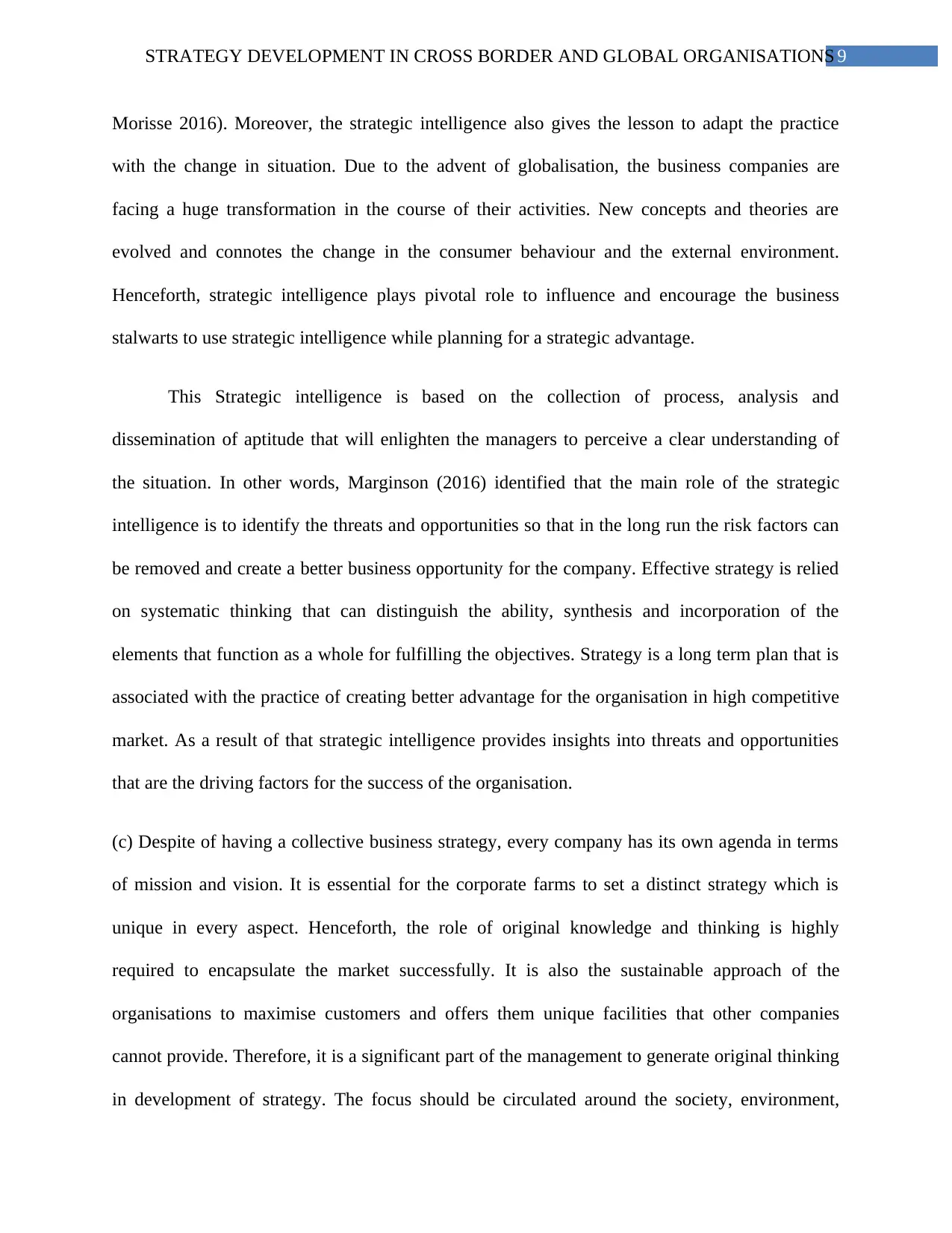
9STRATEGY DEVELOPMENT IN CROSS BORDER AND GLOBAL ORGANISATIONS
Morisse 2016). Moreover, the strategic intelligence also gives the lesson to adapt the practice
with the change in situation. Due to the advent of globalisation, the business companies are
facing a huge transformation in the course of their activities. New concepts and theories are
evolved and connotes the change in the consumer behaviour and the external environment.
Henceforth, strategic intelligence plays pivotal role to influence and encourage the business
stalwarts to use strategic intelligence while planning for a strategic advantage.
This Strategic intelligence is based on the collection of process, analysis and
dissemination of aptitude that will enlighten the managers to perceive a clear understanding of
the situation. In other words, Marginson (2016) identified that the main role of the strategic
intelligence is to identify the threats and opportunities so that in the long run the risk factors can
be removed and create a better business opportunity for the company. Effective strategy is relied
on systematic thinking that can distinguish the ability, synthesis and incorporation of the
elements that function as a whole for fulfilling the objectives. Strategy is a long term plan that is
associated with the practice of creating better advantage for the organisation in high competitive
market. As a result of that strategic intelligence provides insights into threats and opportunities
that are the driving factors for the success of the organisation.
(c) Despite of having a collective business strategy, every company has its own agenda in terms
of mission and vision. It is essential for the corporate farms to set a distinct strategy which is
unique in every aspect. Henceforth, the role of original knowledge and thinking is highly
required to encapsulate the market successfully. It is also the sustainable approach of the
organisations to maximise customers and offers them unique facilities that other companies
cannot provide. Therefore, it is a significant part of the management to generate original thinking
in development of strategy. The focus should be circulated around the society, environment,
Morisse 2016). Moreover, the strategic intelligence also gives the lesson to adapt the practice
with the change in situation. Due to the advent of globalisation, the business companies are
facing a huge transformation in the course of their activities. New concepts and theories are
evolved and connotes the change in the consumer behaviour and the external environment.
Henceforth, strategic intelligence plays pivotal role to influence and encourage the business
stalwarts to use strategic intelligence while planning for a strategic advantage.
This Strategic intelligence is based on the collection of process, analysis and
dissemination of aptitude that will enlighten the managers to perceive a clear understanding of
the situation. In other words, Marginson (2016) identified that the main role of the strategic
intelligence is to identify the threats and opportunities so that in the long run the risk factors can
be removed and create a better business opportunity for the company. Effective strategy is relied
on systematic thinking that can distinguish the ability, synthesis and incorporation of the
elements that function as a whole for fulfilling the objectives. Strategy is a long term plan that is
associated with the practice of creating better advantage for the organisation in high competitive
market. As a result of that strategic intelligence provides insights into threats and opportunities
that are the driving factors for the success of the organisation.
(c) Despite of having a collective business strategy, every company has its own agenda in terms
of mission and vision. It is essential for the corporate farms to set a distinct strategy which is
unique in every aspect. Henceforth, the role of original knowledge and thinking is highly
required to encapsulate the market successfully. It is also the sustainable approach of the
organisations to maximise customers and offers them unique facilities that other companies
cannot provide. Therefore, it is a significant part of the management to generate original thinking
in development of strategy. The focus should be circulated around the society, environment,
Paraphrase This Document
Need a fresh take? Get an instant paraphrase of this document with our AI Paraphraser
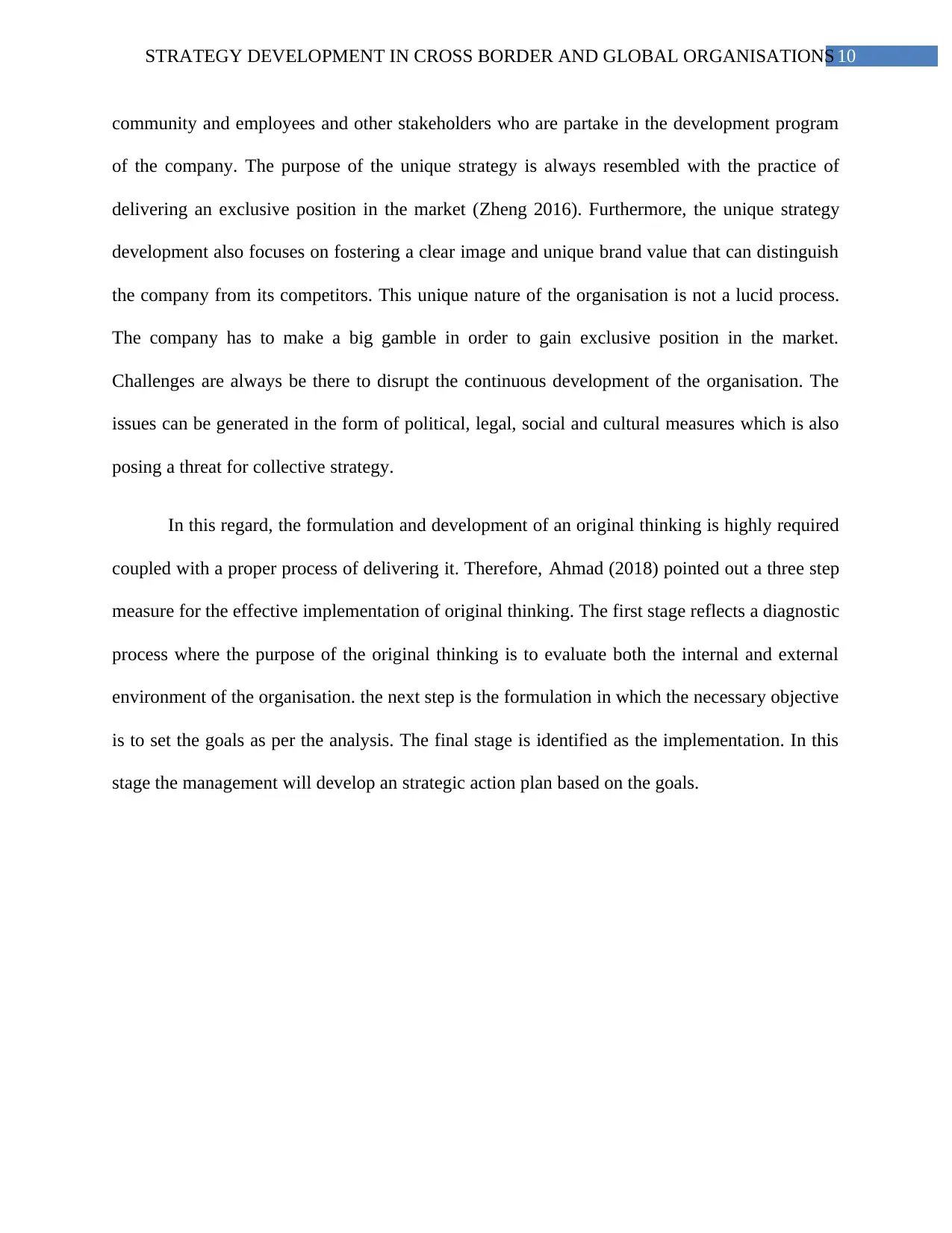
10STRATEGY DEVELOPMENT IN CROSS BORDER AND GLOBAL ORGANISATIONS
community and employees and other stakeholders who are partake in the development program
of the company. The purpose of the unique strategy is always resembled with the practice of
delivering an exclusive position in the market (Zheng 2016). Furthermore, the unique strategy
development also focuses on fostering a clear image and unique brand value that can distinguish
the company from its competitors. This unique nature of the organisation is not a lucid process.
The company has to make a big gamble in order to gain exclusive position in the market.
Challenges are always be there to disrupt the continuous development of the organisation. The
issues can be generated in the form of political, legal, social and cultural measures which is also
posing a threat for collective strategy.
In this regard, the formulation and development of an original thinking is highly required
coupled with a proper process of delivering it. Therefore, Ahmad (2018) pointed out a three step
measure for the effective implementation of original thinking. The first stage reflects a diagnostic
process where the purpose of the original thinking is to evaluate both the internal and external
environment of the organisation. the next step is the formulation in which the necessary objective
is to set the goals as per the analysis. The final stage is identified as the implementation. In this
stage the management will develop an strategic action plan based on the goals.
community and employees and other stakeholders who are partake in the development program
of the company. The purpose of the unique strategy is always resembled with the practice of
delivering an exclusive position in the market (Zheng 2016). Furthermore, the unique strategy
development also focuses on fostering a clear image and unique brand value that can distinguish
the company from its competitors. This unique nature of the organisation is not a lucid process.
The company has to make a big gamble in order to gain exclusive position in the market.
Challenges are always be there to disrupt the continuous development of the organisation. The
issues can be generated in the form of political, legal, social and cultural measures which is also
posing a threat for collective strategy.
In this regard, the formulation and development of an original thinking is highly required
coupled with a proper process of delivering it. Therefore, Ahmad (2018) pointed out a three step
measure for the effective implementation of original thinking. The first stage reflects a diagnostic
process where the purpose of the original thinking is to evaluate both the internal and external
environment of the organisation. the next step is the formulation in which the necessary objective
is to set the goals as per the analysis. The final stage is identified as the implementation. In this
stage the management will develop an strategic action plan based on the goals.
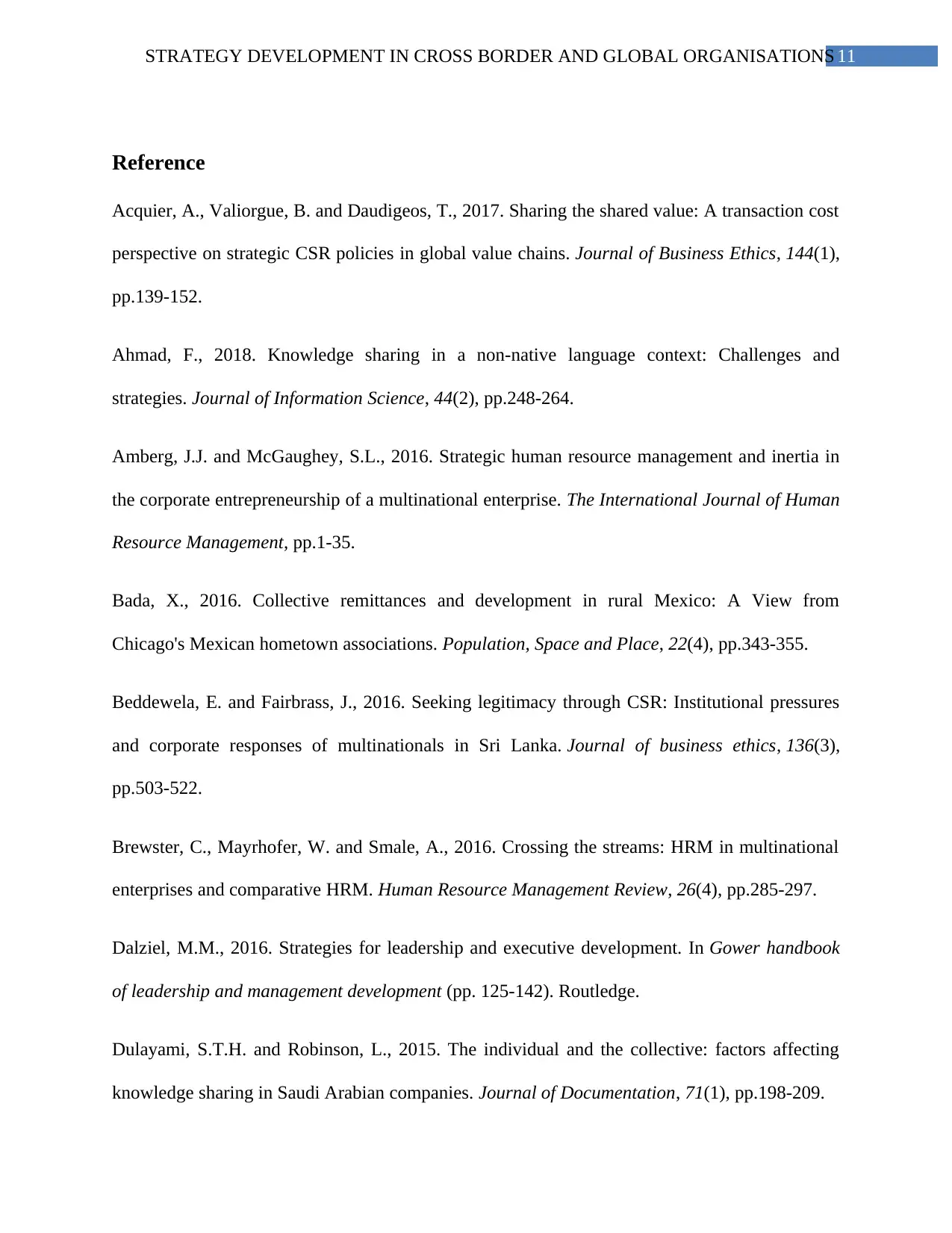
11STRATEGY DEVELOPMENT IN CROSS BORDER AND GLOBAL ORGANISATIONS
Reference
Acquier, A., Valiorgue, B. and Daudigeos, T., 2017. Sharing the shared value: A transaction cost
perspective on strategic CSR policies in global value chains. Journal of Business Ethics, 144(1),
pp.139-152.
Ahmad, F., 2018. Knowledge sharing in a non-native language context: Challenges and
strategies. Journal of Information Science, 44(2), pp.248-264.
Amberg, J.J. and McGaughey, S.L., 2016. Strategic human resource management and inertia in
the corporate entrepreneurship of a multinational enterprise. The International Journal of Human
Resource Management, pp.1-35.
Bada, X., 2016. Collective remittances and development in rural Mexico: A View from
Chicago's Mexican hometown associations. Population, Space and Place, 22(4), pp.343-355.
Beddewela, E. and Fairbrass, J., 2016. Seeking legitimacy through CSR: Institutional pressures
and corporate responses of multinationals in Sri Lanka. Journal of business ethics, 136(3),
pp.503-522.
Brewster, C., Mayrhofer, W. and Smale, A., 2016. Crossing the streams: HRM in multinational
enterprises and comparative HRM. Human Resource Management Review, 26(4), pp.285-297.
Dalziel, M.M., 2016. Strategies for leadership and executive development. In Gower handbook
of leadership and management development (pp. 125-142). Routledge.
Dulayami, S.T.H. and Robinson, L., 2015. The individual and the collective: factors affecting
knowledge sharing in Saudi Arabian companies. Journal of Documentation, 71(1), pp.198-209.
Reference
Acquier, A., Valiorgue, B. and Daudigeos, T., 2017. Sharing the shared value: A transaction cost
perspective on strategic CSR policies in global value chains. Journal of Business Ethics, 144(1),
pp.139-152.
Ahmad, F., 2018. Knowledge sharing in a non-native language context: Challenges and
strategies. Journal of Information Science, 44(2), pp.248-264.
Amberg, J.J. and McGaughey, S.L., 2016. Strategic human resource management and inertia in
the corporate entrepreneurship of a multinational enterprise. The International Journal of Human
Resource Management, pp.1-35.
Bada, X., 2016. Collective remittances and development in rural Mexico: A View from
Chicago's Mexican hometown associations. Population, Space and Place, 22(4), pp.343-355.
Beddewela, E. and Fairbrass, J., 2016. Seeking legitimacy through CSR: Institutional pressures
and corporate responses of multinationals in Sri Lanka. Journal of business ethics, 136(3),
pp.503-522.
Brewster, C., Mayrhofer, W. and Smale, A., 2016. Crossing the streams: HRM in multinational
enterprises and comparative HRM. Human Resource Management Review, 26(4), pp.285-297.
Dalziel, M.M., 2016. Strategies for leadership and executive development. In Gower handbook
of leadership and management development (pp. 125-142). Routledge.
Dulayami, S.T.H. and Robinson, L., 2015. The individual and the collective: factors affecting
knowledge sharing in Saudi Arabian companies. Journal of Documentation, 71(1), pp.198-209.
⊘ This is a preview!⊘
Do you want full access?
Subscribe today to unlock all pages.

Trusted by 1+ million students worldwide
1 out of 14
Related Documents
Your All-in-One AI-Powered Toolkit for Academic Success.
+13062052269
info@desklib.com
Available 24*7 on WhatsApp / Email
![[object Object]](/_next/static/media/star-bottom.7253800d.svg)
Unlock your academic potential
Copyright © 2020–2026 A2Z Services. All Rights Reserved. Developed and managed by ZUCOL.





